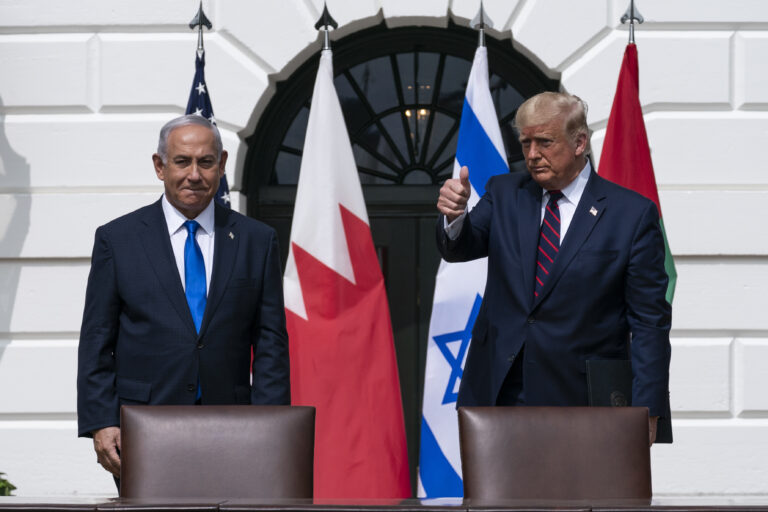The United Arab Emirates could pull out of a peace deal it signed five years ago to normalize relations with Israel, a senior Emirati official warned twice this week, as Israeli plans to annex the West Bank spark backlash in the region.
“The future of Palestine continues to be the cornerstone of a peaceful future for the Middle East,” Lana Nusseibeh, the UAE’s assistant minister for political affairs, said at a forum on Monday.
Why It Matters
U.S. President Donald Trump has pledged to bring peace to the world in his second term, with his foreign policy team insisting they can persuade more nations to join the Abraham Accords, including longtime adversaries such as Syria and Lebanon, where Israel remains militarily involved.
The UAE’s new warning—a surprising shift—highlights an unwillingness among Gulf Arab states to overlook the actions of Israel, America’s strongest regional ally, whose decisions have made diplomatic engagement difficult at a time of growing frustration over the war in Gaza.
The United States considers Gulf nations important allies in curbing Iran’s influence, and for improving Arab relations with Israel and advancing economic and technological cooperation.
Newsweek has reached out to the U.S. Department of State, the UAE’s Foreign Ministry and the office of Israel’s prime minister for comment.

Alex Brandon/AP Photo
What To Know
“Annexation by Israel of Palestinian land, if pursued, would not only close the door to peace and integration, it would betray the very spirit of the Abraham Accords,” Nusseibeh said at the Hili Forum in Abu Dhabi, according to local media reports.
“It is a matter of principle, and it is a matter of peace for our region. It is also a red line,” she said. In similar comments made last week, the Emirati envoy said such a move would undermine prospects for lasting peace.
In August, Israel approved a plan to expand settlements in the West Bank, linking the city of Ma’ale Adumim to East Jerusalem. Similar projects have been delayed in the past by U.S. pressure over their threat to a contiguous Palestinian state.
Among the Arab states, the UAE has moved the quickest to implement full normalization of relations with Israel, unlike Egypt, the first country to sign a peace treaty in 1979, and Jordan, which signed one in 1994. Bilateral ties between Jordan, Egypt and Israel have remained largely limited to government diplomacy and trade, in what many describe as a “cold peace,” reinforced by strong public opposition.
By contrast, the Emirati government under the rule of Sheikh Mohamed bin Zayed Al Nahyan has actively promoted normalization across cultural and social spheres, something Israelis have long said was missing in earlier agreements with its Arab neighbors. This has been most visible in the increase in Israeli tourism in the country.
More Regional Instability?
Building on the 2020 agreement is a central element of Israel’s vision for a new Middle East to expand ties with Arab states, while also neutralizing the multiple security threats along its borders.
Saudi Arabia, whose Crown Prince Mohamed bin Salman has been a close friend to Trump, halted a breakthrough on the deal in 2024 following the war in Gaza. Securing Riyadh’s support would have been a major win for Trump, but the kingdom has consistently maintained that any agreement would hinge on a clear path to Palestinian sovereignty.
The Emirati and Saudi leaders, whose governments both oppose Hamas, met in Riyadh earlier this week.
Nusseibeh reportedly said Hamas and Israeli “extremists” would be to blame if the accords are derailed. Separately on Monday, the Emirati Foreign Ministry condemned the “terrorist shooting attack” in Jerusalem.
The Abraham Accords were also signed by Bahrain, Sudan and Morocco. In the latter, large public demonstrations have been held to oppose the agreement following the Gaza war.
What People Are Saying
Brian Katulis, a senior fellow at the Middle East Institute, told Newsweek: “The UAE’s statements demonstrate a willingness to exercise leverage that it has on both the calculus of the current Israeli government and the second Trump administration. The UAE is definitely looking to shape the outcomes of what has been a disastrous situation for Palestinians and Israelis alike—one that detrimentally affects Emirati security and economic interests.”
An unnamed Israeli official told The Washington Post on Saturday: “The Emirates have expressed concerns about [annexation] before through other channels, but the statement came as a surprise. It’s very unusual.”
UAE political analyst Mohamed Baharoon wrote in report for the Middle East Institute in August: “The Abraham Accords cannot be expanded without a shift in Israeli behavior. Peace will not come from dominance, but from cooperation. That requires Israel to act like a citizen of the region, not an occupying power.”
What Happens Next
It remains to be seen if Israel will seek de-escalating with Arab countries or if it will pursue annexation.


